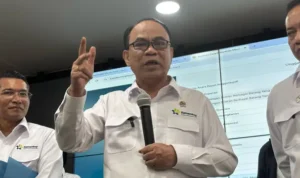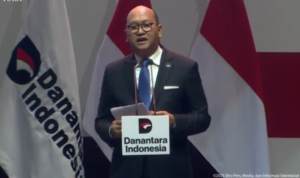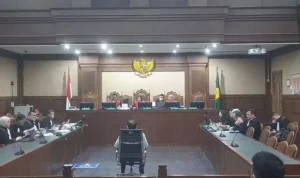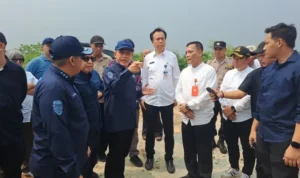INDONESIAUPDATES.COM, News En – A 53-year-old German national, identified as AF, has been named a suspect by the Bali Police for illegally converting protected rice paddies and sustainable agricultural land into commercial developments in Ubud. The controversial case has raised concerns over zoning violations and the decline of agricultural land in the region.
AF, who serves as the Director of Parq Ubud Partners, Tomorrow Land Development Bali, and Alfa Management Bali, is accused of constructing facilities, including a villa, spa center, and animal farm, without securing the necessary permits.
“The suspect developed these facilities on protected rice paddies and sustainable agricultural land, violating zoning regulations,” Bali Regional Police Chief Daniel Adityajaya stated on Tuesday.
PARQ Ubud Closure
On January 20, the Gianyar Regency Government officially shut down PARQ Ubud, also known as “The Russian Village.” Located on Jalan Sriwedari in Tegallalang, Ubud, the apartment complex, which includes a co-working space, restaurant, café, and other amenities, was closed due to multiple local regulation violations.
Meetings had previously been held between PARQ Ubud representatives and the Gianyar Regency Government on May 30 and November 1, 2024, to address building permit issues, but the violations persisted.
Investigation Findings
The police investigation revealed that the construction spanned three zones: sustainable agricultural land, protected rice paddies, plantation areas, and tourism zones. Working closely with the Gianyar Regency Public Works and Housing Department, investigators confirmed that AF violated spatial planning laws.
The investigation involved interviews with 28 witnesses and an examination of 34 ownership certificates tied to the developments.
Impact on Bali’s Agriculture
The illegal land conversion has contributed to the ongoing decline in agricultural land in Bali, posing a threat to the island’s food self-sufficiency efforts. Protected rice paddies and sustainable agricultural zones are vital for maintaining the region’s traditional farming practices and food security.
Call for Enforcement
The closure of PARQ Ubud and the legal action against AF underscore Bali’s commitment to enforcing zoning laws and protecting its agricultural heritage. Authorities have vowed to prevent similar violations and ensure sustainable land use across the island.
The case has sparked widespread debate, highlighting the challenges of balancing tourism development with the preservation of Bali’s cultural and agricultural identity.
Frequently Asked Questions (FAQ)
Illegal Land Conversion Case in Bali
1. Who is the main suspect in the illegal land conversion case?
The suspect is a 53-year-old German national, identified as AF. He is the Director of Parq Ubud Partners, Tomorrow Land Development Bali, and Alfa Management Bali.
2. What is AF accused of?
AF is accused of illegally converting protected rice paddies and sustainable agricultural land into commercial developments, including a villa, spa center, and animal farm, without obtaining the required permits.
3. What is PARQ Ubud, and why was it shut down?
PARQ Ubud, also known as “The Russian Village,” is an apartment complex in Tegallalang, Ubud. It features a co-working space, restaurant, café, and other facilities. It was shut down by the Gianyar Regency Government on January 20, 2025, due to violations of local zoning and building permit regulations.
4. What laws did the suspect allegedly violate?
The suspect allegedly violated zoning and spatial planning laws by building on protected rice paddies and sustainable agricultural land, areas designated for food production and traditional farming.
5. What did the investigation uncover?
The investigation revealed that the construction site spans three zones: sustainable agricultural land, protected rice paddies, plantation areas, and tourism zones. Police interviewed 28 witnesses and examined 34 ownership certificates to confirm the violations.
6. How does this impact Bali’s agricultural land?
The illegal land conversion has contributed to the decline of agricultural land in Bali, threatening food self-sufficiency efforts and disrupting traditional farming practices.
7. What actions are authorities taking to prevent similar violations?
Authorities have committed to enforcing zoning laws, closing down unauthorized developments, and improving monitoring of protected areas. Efforts include collaboration with local governments to ensure compliance with spatial planning regulations.
8. Why is this case significant?
This case highlights the ongoing tension between tourism development and the preservation of Bali’s cultural and agricultural heritage. It emphasizes the importance of protecting sustainable land use while balancing economic growth.
FOLLOW INDONESIAUPDATES.COM ON GOOGLE NEWS









